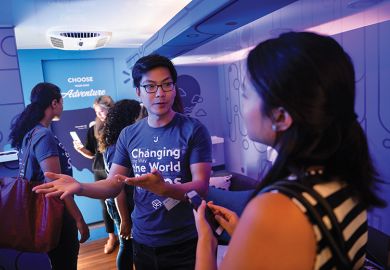Employers now regard the skills with which graduates leave a university as being more important than the institution’s academic reputation, according to a major survey.
The 2022 Global University Employability Ranking, produced by Paris-based HR consultancy Emerging and published by Times Higher Education, asks employers from around the world to rank universities on the employability of their graduates.
The 12th edition of the survey polled more than 10,000 respondents who deal with graduate recruitment across dozens of countries between August and September this year.
The survey questions employers on their recruitment processes, their relationship with universities, and the skills they are looking for in graduates.
Respondents have up to 15 votes each to rate the employability performance of more than 1,000 universities and select the decisive factor behind each of these votes.
Graduate skills, which include soft skills and digital literacy, were voted as the most important factor for employers above all others, rising from being just the fourth most important before the Covid-19 pandemic struck.
These were followed in the results by subject specialisation and academic excellence – which fell from the top spot in recent years.
Employers also responded strongly (with an average score of 8 out of 10) when asked whether they agreed that skills were more important than degrees.
“Recruitment is shifting from [being] degree-based to skills-based,” said Laurent Dupasquier, associate director of Emerging.
“What will matter more and more is what graduate skills the young graduates possess rather than the origin of their degrees.”
He said digital literacy had long been been the most important signifier of employability, but soft skills – including collective intelligence, project management and adaptability – were also important.
“In the future the ability to code will become just as essential as literacy was in the 19th and 20th centuries,” predicted Mr Dupasquier.
Universities are not yet seen as the key provider of digital literacy, he added, often competing with alternative providers or businesses setting up their own in-house training programmes.
Digital capabilities are setting the new norm in a digitalised world and are quickly becoming an integral part of what employers look for in candidates, said Sandrine Belloc, also an associate director at Emerging, who said that the graduate recruitment process would grow to reflect this.
Approximately a quarter of the top 250 universities ranked were from the US, followed by 8 per cent from France, and 7 per cent each from the UK and Germany.
The top five universities ranked were the Massachusetts Institute of Technology, California Institute of Technology, Harvard University, the University of Cambridge and Stanford University – unchanged from the previous year.
The dominance of these US institutions at the top of the list means that the US has turned around 10 years of decline across the rankings, Emerging said.
Register to continue
Why register?
- Registration is free and only takes a moment
- Once registered, you can read 3 articles a month
- Sign up for our newsletter
Subscribe
Or subscribe for unlimited access to:
- Unlimited access to news, views, insights & reviews
- Digital editions
- Digital access to THE’s university and college rankings analysis
Already registered or a current subscriber?




